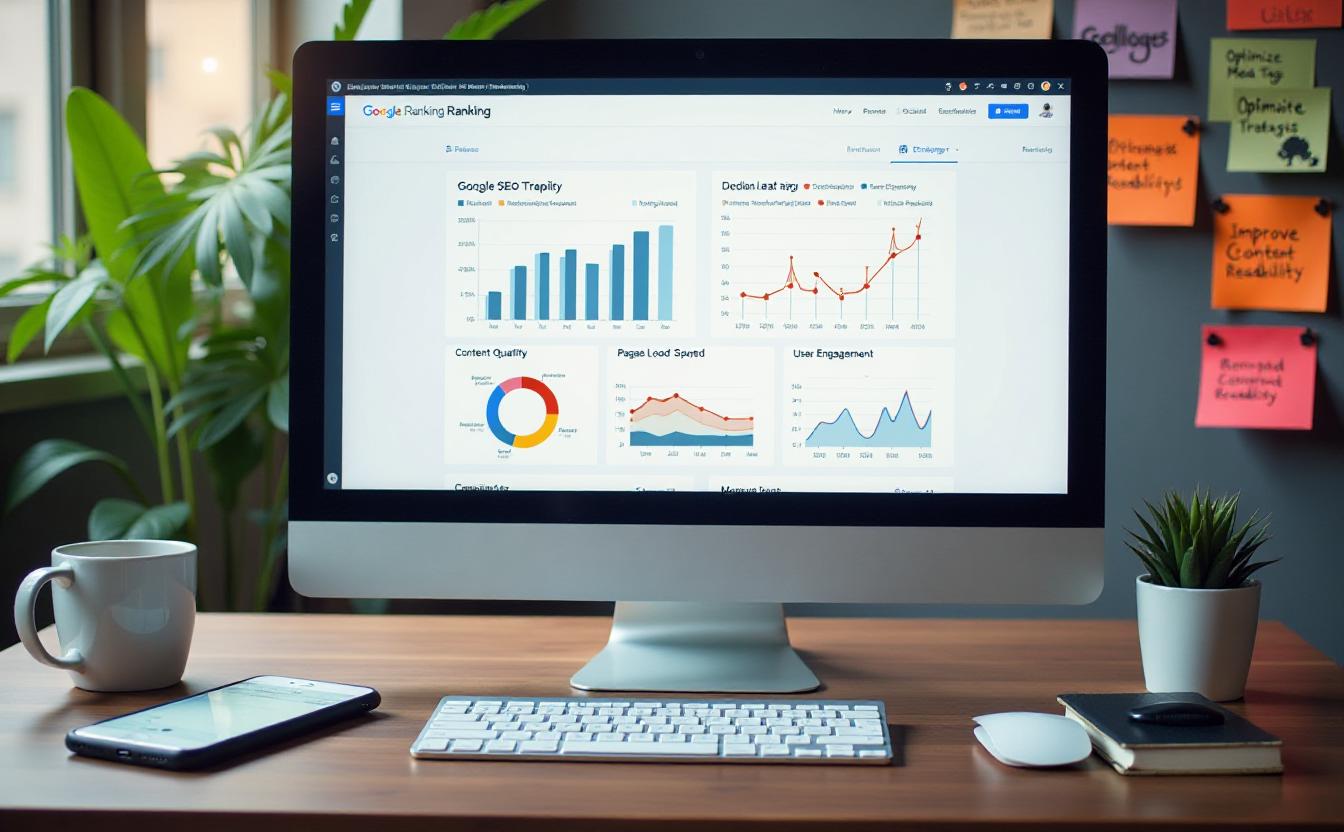Google ranking factors

Key Elements That Influence Google Rankings
Organic web search plays a crucial role for commercial websites, as it directly impacts visibility and customer engagement. When visitors conduct searches, they tend to click on sites that appear on the first page of search results. This means that a well-optimized website can attract free, high-quality traffic without requiring ongoing promotional efforts.A strong ranking in search engine results typically correlates with increased business turnover. Therefore, it is essential for website owners to prioritize search engine optimization (SEO) for their sites or online stores.
Table Of Content
SEO Basics
Search Engine Optimization (SEO) is the foundation of any successful online presence. It refers to the process of improving the visibility of a website in search engine results pages (SERPs). The goal of SEO is to drive organic traffic to your site by making it easier for search engines like Google to understand and rank your content. SEO includes practices such as optimizing content, improving site structure, and ensuring a good user experience. Focusing on SEO basics like title tags, meta descriptions, and relevant content can greatly enhance your website’s visibility.
Technical SEO
Technical SEO refers to optimizing the backend of your website to help search engines crawl and index your site more effectively. This includes aspects like ensuring your site has a clean, logical structure, a sitemap, robots.txt, and proper use of structured data (schema markup). Ensuring your site loads quickly, is mobile-friendly, and secure (with HTTPS) also falls under technical SEO. Search engines prioritize websites that offer a smooth user experience, so paying attention to technical SEO can have a significant impact on your rankings.
Tip
Do you want to snag a better spot on the Google search results? Check your website for free with the rankingCoach from emmo.
Keyword Research
Keyword research is the process of identifying the words and phrases that potential customers use when searching for products, services, or information. This is crucial for SEO, as it allows you to align your content with what users are looking for. Use tools like Google Keyword Planner, Ahrefs, or SEMrush to find keywords with high search volume and low competition. By incorporating these keywords into your content, headings, meta descriptions, and alt texts, you can improve the likelihood that your website will appear in relevant search results.
Content Optimization
Content optimization ensures that your website’s content is valuable, relevant, and easy to read for both users and search engines. This involves strategically placing keywords, using headers (h1, h2, etc.), and ensuring your content answers the user’s search query. It’s important to write naturally while integrating keywords to avoid "keyword stuffing." Additionally, using multimedia elements like images, videos, and infographics can help engage your audience and boost SEO. Regularly updating content to keep it relevant also signals to search engines that your site is fresh and authoritative.
On-Page SEO
On-page SEO refers to the practice of optimizing individual web pages to rank higher in search results. This involves optimizing the content, HTML source code, images, and internal linking structure. Key elements include writing clear and concise title tags, creating meta descriptions that encourage clicks, and using heading tags (h1-h6) properly. It’s also important to ensure that your URL structure is clean and descriptive. Adding alt text to images and using internal links to connect related pages on your site can further enhance your on-page SEO.
Key Elements That Influence Google Rankings
| Ranking Factor | Description |
|---|---|
| Content Quality | High-quality, relevant content that satisfies user intent is crucial for ranking well. |
| Keyword Optimization | Effective use of relevant keywords in titles, headings, and throughout the content helps Google understand the topic. |
| Backlinks | Links from reputable sites indicate trust and authority, positively impacting rankings. |
| User Experience (UX) | A positive user experience, including site speed and mobile-friendliness, enhances rankings. |
| Technical SEO | Proper technical elements like XML sitemaps and structured data help search engines crawl and index your site effectively. |
| Mobile-Friendliness | With the rise of mobile usage, a responsive design is essential for good rankings. |
| Page Load Speed | Fast loading pages improve user satisfaction and are favored by search engines. |
| Secure Website (HTTPS) | Google prefers secure sites, and having an SSL certificate can positively affect rankings. |
Off-Page SEO
Off-page SEO involves activities that take place outside your own website to improve its search engine rankings. The most common form of off-page SEO is link building, which is the process of acquiring backlinks from other reputable websites. Search engines consider backlinks as votes of confidence, signaling that your site is trustworthy and authoritative. However, not all backlinks are created equal—links from high-authority domains carry more weight. Additionally, social media signals, influencer marketing, and brand mentions can indirectly contribute to your off-page SEO by boosting your site's visibility and reputation.
Mobile SEO
Mobile SEO focuses on optimizing your website for users on smartphones and tablets. Given that more than half of all global web traffic now comes from mobile devices, ensuring that your website is mobile-friendly is essential. This involves using responsive design, ensuring fast loading times, and making sure that the content is easily navigable on smaller screens. Google’s mobile-first indexing means that it primarily uses the mobile version of your site for ranking and indexing. Therefore, a well-optimized mobile experience is crucial for maintaining and improving your search engine rankings.
Local SEO
Local SEO is the practice of optimizing your website for local search results. This is especially important for businesses that operate in specific geographic locations. Key strategies include optimizing your Google My Business profile, using local keywords, and ensuring your business name, address, and phone number (NAP) are consistent across the web. Local SEO can help your business appear in local pack listings and on Google Maps, which can drive more local traffic to your website. Reviews and local backlinks also play a critical role in local SEO rankings.
Analytics and Metrics
Tracking and analyzing your website’s performance is critical for improving your SEO strategy. Tools like Google Analytics, Search Console, and other SEO software allow you to measure key metrics such as organic traffic, bounce rate, average session duration, and conversions. Understanding how users interact with your site can help you identify areas for improvement. For example, high bounce rates might indicate that your content isn’t meeting user expectations, while a high average session duration suggests that users find your content engaging.
SEO Content FAQs
What is SEO Basics?
Search Engine Optimization (SEO) is the foundation of any successful online presence. It refers to the process of improving the visibility of a website in search engine results pages (SERPs).
What is Technical SEO?
Technical SEO refers to optimizing the backend of your website to help search engines crawl and index your site more effectively.
What is Content Optimization?
Content optimization ensures that your website’s content is valuable, relevant, and easy to read for both users and search engines.
What is On-Page SEO?
On-page SEO refers to the practice of optimizing individual web pages to rank higher in search results.
What is Off-Page SEO?
Off-page SEO involves activities that take place outside your own website to improve its search engine rankings.










